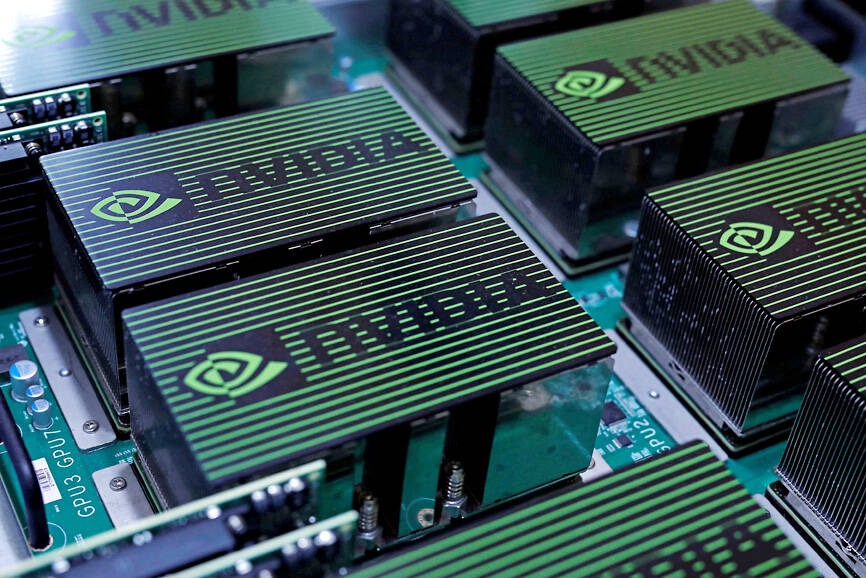Nvidia Corp and Advanced Micro Devices Inc (AMD) have agreed to pay 15 percent of their revenue from Chinese artificial intelligence (AI) chip sales to the US government in a deal to secure export licenses, an unusual arrangement that might unnerve both US companies and Beijing.
Nvidia plans to share 15 percent of the revenue from sales of its H20 AI accelerator in China, a person familiar with the matter said. AMD is to deliver the same share from MI308 revenue, the person added, asking for anonymity to discuss internal deliberations.
The arrangement reflects US President Donald Trump’s consistent effort to engineer a financial payout for the US in return for concessions on trade. His administration has shown a willingness to relax trade conditions such as tariffs in return for giant investment in the US — as with Apple Inc’s pledge to spend US$600 billion on domestic manufacturing — but such a narrow, select export tax has little precedent in modern corporate history.

Photo: Tyrone Siu, Reuters
“This seeming quid pro quo is unprecedented from an export control perspective. The arrangement risks invalidating the national security rationale for US export controls,” said Jacob Feldgoise, a researcher at the Washington-based Center for Security and Emerging Technology.
It “will likely undermine the US’ position when negotiating with allies to implement complementary controls,” he said. “Allies may not believe US policymakers if they are willing to trade away those same national security concerns for economic concessions — either from US companies or foreign governments.”
An Nvidia spokesperson said the company follows US export rules, adding that while it has not shipped H20 chips to China for months, it hopes the rules would allow US companies to compete in China.
AMD did not immediately respond to a request for comment.
The Financial Times earlier reported the development.
It followed a separate report from the same outlet that the US Department of Commerce had begun issuing H20 licenses last week, days after Nvidia chief executive officer Jensen Huang (黃仁勳) met with Trump.
Huang has lobbied long and hard for the lifting of restrictions, arguing that walling China off would only slow the spread of US technology and encourage local rivals such as Huawei Technologies Co (華為).
“It’s a strategic bargaining chip” that tightens Washington’s grip on a critical technology sphere during trade negotiations with China, said Hebe Chen (陳碧菲), an analyst with Vantage Markets Pty Ltd in Melbourne.
“Over time, this hurdle for chips entering China will likely deter Nvidia and AMD from deeper expansion in the world’s largest chip-importing market, while giving local Chinese producers a clear edge to capture market share and accelerate domestic semiconductor innovation,” Chen said.
If Washington goes ahead with the tax, it should funnel some capital to the US, but not an enormous amount in relative terms. Both Nvidia and AMD have said it would take time to ramp back up production of their China-specific products — even if order levels return to previous levels, which is uncertain.

In Italy’s storied gold-making hubs, jewelers are reworking their designs to trim gold content as they race to blunt the effect of record prices and appeal to shoppers watching their budgets. Gold prices hit a record high on Thursday, surging near US$5,600 an ounce, more than double a year ago as geopolitical concerns and jitters over trade pushed investors toward the safe-haven asset. The rally is putting undue pressure on small artisans as they face mounting demands from customers, including international brands, to produce cheaper items, from signature pieces to wedding rings, according to interviews with four independent jewelers in Italy’s main

Japanese Prime Minister Sanae Takaichi has talked up the benefits of a weaker yen in a campaign speech, adopting a tone at odds with her finance ministry, which has refused to rule out any options to counter excessive foreign exchange volatility. Takaichi later softened her stance, saying she did not have a preference for the yen’s direction. “People say the weak yen is bad right now, but for export industries, it’s a major opportunity,” Takaichi said on Saturday at a rally for Liberal Democratic Party candidate Daishiro Yamagiwa in Kanagawa Prefecture ahead of a snap election on Sunday. “Whether it’s selling food or

CONCERNS: Tech companies investing in AI businesses that purchase their products have raised questions among investors that they are artificially propping up demand Nvidia Corp chief executive officer Jensen Huang (黃仁勳) on Saturday said that the company would be participating in OpenAI’s latest funding round, describing it as potentially “the largest investment we’ve ever made.” “We will invest a great deal of money,” Huang told reporters while visiting Taipei. “I believe in OpenAI. The work that they do is incredible. They’re one of the most consequential companies of our time.” Huang did not say exactly how much Nvidia might contribute, but described the investment as “huge.” “Let Sam announce how much he’s going to raise — it’s for him to decide,” Huang said, referring to OpenAI

The global server market is expected to grow 12.8 percent annually this year, with artificial intelligence (AI) servers projected to account for 16.5 percent, driven by continued investment in AI infrastructure by major cloud service providers (CSPs), market researcher TrendForce Corp (集邦科技) said yesterday. Global AI server shipments this year are expected to increase 28 percent year-on-year to more than 2.7 million units, driven by sustained demand from CSPs and government sovereign cloud projects, TrendForce analyst Frank Kung (龔明德) told the Taipei Times. Demand for GPU-based AI servers, including Nvidia Corp’s GB and Vera Rubin rack systems, is expected to remain high,